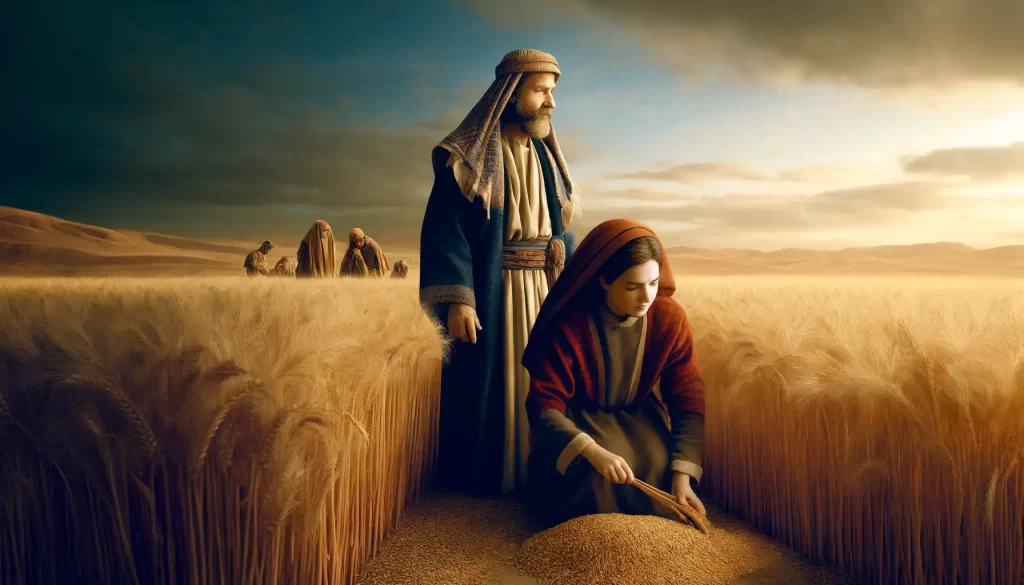
National Association of Christian Ministers Summary Series
The account of Ruth and Boaz is a beautiful story of loyalty, redemption, and love found in the Old Testament book of Ruth. This book portrays the faithfulness of God and highlights the importance of kindness and compassion. Here is the narrative of Ruth and Boaz, along with relevant scriptural citations:
1. Naomi’s Family in Moab (Ruth 1:1-5):
During the time of the judges, a famine struck the land of Israel. A man named Elimelech, along with his wife Naomi and their two sons, left Bethlehem in Judah and settled in the country of Moab. Unfortunately, Elimelech died, leaving Naomi a widow with her two sons, who married Moabite women named Orpah and Ruth.
2. Naomi’s Return to Bethlehem (Ruth 1:6-22):
After some time, both of Naomi’s sons also died, leaving her with her two daughters-in-law. Upon hearing that God had provided food for His people in Bethlehem, Naomi decided to return to her homeland. She encouraged her daughters-in-law to stay in Moab and find new husbands, but Ruth was determined to stay with her and accompany her back to Bethlehem.
3. Ruth’s Commitment to Naomi (Ruth 1:16-18):
Ruth’s famous declaration of loyalty to Naomi is recorded in these verses. She expressed her devotion by saying, “Where you go, I will go, and where you stay, I will stay. Your people will be my people, and your God my God.” Ruth’s dedication to Naomi showcased her faithfulness and love.
4. Ruth’s Gleaning in Boaz’s Field (Ruth 2:1-23):
As a widow, Ruth had to find a way to provide for herself and Naomi. She began gleaning in the fields, which involved collecting leftover grains after the harvesters. Ruth happened to come to the field of Boaz, a wealthy and honorable man who was a relative of Naomi’s deceased husband. Boaz noticed Ruth and showed her kindness and favor, allowing her to glean freely and even providing her with extra food.
5. Naomi’s Plan and Ruth’s Request (Ruth 3:1-18):
Naomi devised a plan to secure a future for Ruth by proposing that she approach Boaz during the time of the barley harvest. Ruth followed Naomi’s instructions and went to Boaz while he was sleeping on the threshing floor. Ruth asked Boaz to redeem her, as he was a close relative who had the right to marry her and take care of her as a kinsman-redeemer.
6. Boaz’s Redemption and Marriage (Ruth 4:1-13):
Boaz acknowledged Ruth’s request and realized that there was a closer relative who had the first right to redeem Ruth. Boaz went to the town gate, where legal matters were traditionally addressed, and presented the case to the nearer relative. When the relative declined, Boaz publicly redeemed the property and married Ruth, thus fulfilling the role of kinsman-redeemer.
7. Boaz and Ruth’s Son, Obed (Ruth 4:13-22):
Boaz and Ruth’s marriage resulted in the birth of a son named Obed. Naomi became a nurse to Obed, and the women of Bethlehem rejoiced with Naomi, recognizing God’s faithfulness in providing an heir for her. Obed would later become the grandfather of King David, making Ruth an ancestor of Jesus Christ.
The account of Ruth and Boaz highlights the power of loyalty, kindness, and God’s providence. Ruth’s devotion to Naomi and Boaz’s generosity and integrity paved the way for their union, ultimately leading to the continuation of the lineage that produced King David and, eventually, the Messiah. The story of Ruth and Boaz serves as a reminder of God’s redemption and His ability to work through ordinary individuals for His divine purposes.




